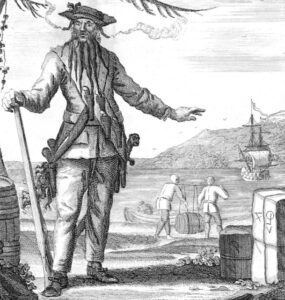
Image from Wikipedia CC.
Higher education in the United States is a big ship, with a well-established route and trade. I was a paying passenger, for the usual time, then served as a line officer for two decades. One day, in some backwater in the Horse Latitudes, I jumped ship to live among the pirates. The lack of uniforms alone has been refreshing.
Higher ed seems incapable of changing its course from spiraling costs, crippling student debt, an overly-instrumental approach, and a reliance on contingent faculty. There is clearly a feeling on the bridge that the captain has steered too close to some coast of peril. In the age of contagion there may even be widespread mutiny, unless the captain agrees to put in to port for overhaul.
But I believe in education as one of life’s purposes and rewards, and you have asked, me hearty, if I have any ragged, gaunt-eyed advice. If you had been born a Barron, you would not need advice, since you would have all your father’s inherited plunder, but most of us are not so fortunate. At least I have faced all my own tests.
So let us start here: You have wanted badly to be grown up. You crave adventure, as I have. Now you will have your chance. The outcome of this voyage is mostly dependent on you, which is only one reason it is exciting. I am always here if you need me, as are many others. But here are some tips I would tell any young man or woman of humble birth, as we are, as they embark on their own four-year cruise, even if that turns out to be partly virtual.
Your job now is being a student, so take it seriously. This does not mean being grimly serious. It means doing your work incrementally. You can lift light weights all day long, but no one can wait until later and hope to lift 5,000 pounds all at once.
Everyone needs a day off in a semester, even if they stay healthy, but otherwise go to all your classes. Take real notes. Ask questions and participate in discussions. Get curious. When you cannot be curious, ask questions anyway. The secret of the university is that everything is connected to everything else. Learning complexity in one field is learning there is complexity in others, and in you.
Read everything assigned, even if you have to read quickly sometimes. Read with a pencil in hand, and annotate and underline. You will not love it all, but this is your job, and one of its benefits: being asked to read books, stories, articles, poems, essays, and plays you might never have found on your own. No one can know what will become an influence.
It is incorrect to say that those who go to office hours get better grades because they suck up. That is how those who are hoping to game the system think. Those who seek out teachers often get to see how else a discussion can be framed, which is a form of deeper engagement with the topic, or how it fits in an even bigger discussion than happens in the classroom. It also lets teachers see who you are, so they can try to make you more so.
Do not presume to know about your teachers, who have entire hidden lives. (Some of them were once pirates.) I took a class once with a professor everyone disliked for his soft-spoken awkwardness. My girlfriend and her sister blamed him for their low grades. Determined not to fail, I set all the gossip aside and discovered he was an excellent teacher. Who cares if your teacher is not likable? Learn what each has to teach.
As you slow down and try to appreciate others, also learn to evaluate your own labor. If you can admit you have not tried your hardest, you can try harder, soon. Find your true limits, which are always somewhere beyond where you think they are. Have no regrets.
Remember what I have always told you and your brother: Choose a situation, do it as well as possible, and use the experience to leverage entry to the next situation.
Time for yourself will come in waves. Take advantage of it. Sometimes that will mean sleeping or rum, and sometimes it will mean investing your surplus by trying something new. A thing you encounter by chance might become the basis for a life. As an undergrad I created a volunteer departmental newsletter, which led to similar paid work, and the honor of escorting poet Gwendolyn Brooks for a day.
Talk to people. They will balance and ground your views, as well as entertain, befriend, comfort, and even love you, in some cases. Call your father, for Poseidon’s sake.
Do not make yourself feel better with money, because there is not any. Loans may be necessary, but they mortgage your future for someone else’s benefit. Remember how I said things are paid for with time, labor, or money? Get to work. Stick to it.
All the metaphors of sticking-to-it are horrors, in a sense. Military cadre told us to expect to have to stay afloat, if a ship went down under us in the middle of the sea, until we could wade ashore. I think of them fondly.
You can and will succeed. You will know that in your body very quickly. The university is a system closed round with traditions, and doing well there often comes down to demonstrating a set of skills you can learn and implement fairly easily.
Precocious kid, you started questioning the purpose of things early. The purpose of university is to make the most of you. With a life’s education you will be good company to yourself and others, and will know to keep a weather eye on the horizon for more adventure.
